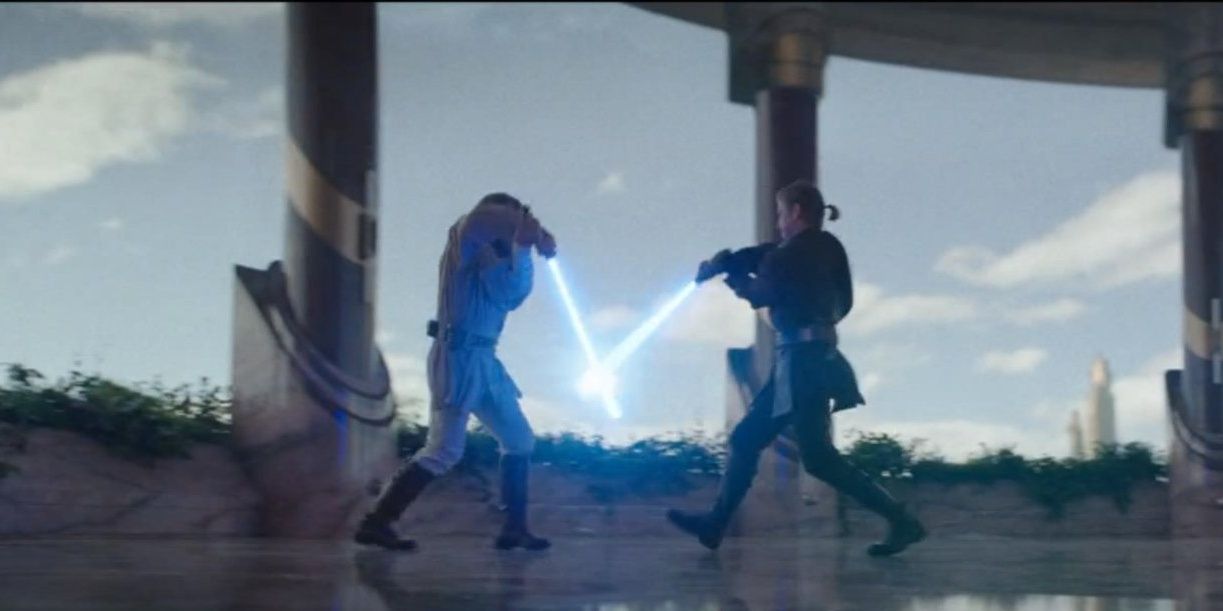
The Controversy of Obi-Wan Kenobi's Training of Anakin Skywalker

Exploring the mixed opinions of Star Wars fans about Jedi becoming warriors and the mistake they believe Obi-Wan Kenobi made while training Anakin Skywalker.
The Training of Anakin Skywalker
Star Wars fans have long debated the training of Anakin Skywalker by Obi-Wan Kenobi, with some pointing out a mistake they believe Obi-Wan made that doesn't get much attention. Anakin's journey as a Jedi began when he was introduced to Obi-Wan by Jedi Master Qui-Gon Jinn in Star Wars: Episode I — The Phantom Menace. This initial encounter set the stage for a deep bond between Anakin and Obi-Wan, one that would eventually be overshadowed by jealousy and rivalry.
obi-wan versus anakin in a flashback
In a recent Reddit thread, a fan called out a scene in the Obi-Wan Kenobi series, claiming it to be a mistake. The scene in question is a flashback of Anakin having a sparring session with Obi-Wan, during which Obi-Wan praised Anakin for being a great warrior but warned him that his need to prove himself would be his downfall. This sparked a debate among fans about whether Jedi should be considered warriors and the implications of Obi-Wan's words.
The sentiment received mixed reactions, with some fans agreeing that Jedi were not warriors and criticizing Obi-Wan's dialogue, while others defended the line, citing the need for Jedi to protect themselves and the vulnerable. The differing opinions reflect the complex relationship between the Jedi and the concept of warfare within the Star Wars universe.
The Role of Jedi as Warriors
The debate over whether Jedi should be considered warriors is a central point of contention among Star Wars fans. While Jedi are skilled in lightsaber combat and trained in the ways of the Force, their primary role is not that of traditional warriors on the battlefield. Instead, they are tasked with protecting themselves against the Sith and emerging threats, using their skills to maintain peace and balance in the galaxy.
The conflicting perspectives on this issue highlight the nuanced nature of the Jedi's identity and purpose. Some fans argue that Jedi should not be seen as warriors, while others acknowledge the necessity for Jedi to engage in combat to fulfill their duty as peacekeepers. This ongoing debate underscores the complexity of the Jedi Order and its place within the Star Wars narrative.
The differing views on the role of Jedi as warriors also shed light on the distinct approaches of Obi-Wan Kenobi and Qui-Gon Jinn in training Anakin. The contrasting mentorship styles reflect the diverse philosophies within the Jedi Order and the impact they had on Anakin's development as a Jedi.
The Tragic Relationship Between Obi-Wan Kenobi and Anakin Skywalker
The relationship between Obi-Wan Kenobi and Anakin Skywalker is one of the most tragic and compelling narratives in the Star Wars saga. Their bond, initially resembling that of brothers, ultimately unraveled due to jealousy, rivalry, and the lure of the dark side. The consequences of their fractured relationship reverberated throughout the galaxy and defined the course of the Star Wars story.
The pivotal moments of their falling-out, including the confrontation between Obi-Wan and Vader, reflect the profound emotional depth of their connection. Obi-Wan's remorse and attachment to the boy he raised, juxtaposed with Anakin's descent into darkness, encapsulate the tragedy of their relationship. The decision to walk away from the confrontation, driven by a mix of mercy and resignation, marks a poignant culmination of their bond and the choices that led them to that moment.
The complex dynamics between Obi-Wan and Anakin, as well as the implications of their actions and decisions, continue to captivate and resonate with Star Wars fans. The enduring impact of their relationship serves as a poignant reminder of the complexities and consequences of the choices made within the Star Wars universe.














